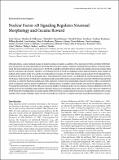Nuclear factor κB signaling regulates neuronal morphology and cocaine reward
Author(s)
Russo, Scott J.; Wilkinson, Matthew B.; Mazei-Robison, Michelle S.; Dietz, David M.; Maze, Ian; Krishnan, Vaishnav; Rentha, William; Graham, Ami; Birnbaum, Shari G.; Green, Thomas A.; Robison, Bruce; Lesselyong, Alan; Perrotti, Linda I.; Bolaños, Carlos A.; Kumar, Arvind; Clark, Michael S.; Neumaier, John F.; Bhakar, Asha L.; Barker, Philip A.; Nestler, Eric J.; Neve, Rachael L.; ... Show more Show less
DownloadRusso-2009-Nuclear Factor kappa.pdf (349.6Kb)
PUBLISHER_POLICY
Publisher Policy
Article is made available in accordance with the publisher's policy and may be subject to US copyright law. Please refer to the publisher's site for terms of use.
Terms of use
Metadata
Show full item recordAbstract
Although chronic cocaine-induced changes in dendritic spines on nucleus accumbens (NAc) neurons have been correlated with behavioral sensitization, the molecular pathways governing these structural changes, and their resulting behavioral effects, are poorly understood. The transcription factor, nuclear factor {kappa} B (NF{kappa}B), is rapidly activated by diverse stimuli and regulates expression of many genes known to maintain cell structure. Therefore, we evaluated the role of NF{kappa}B in regulating cocaine-induced dendritic spine changes on medium spiny neurons of the NAc and the rewarding effects of cocaine. We show that chronic cocaine induces NF{kappa}B-dependent transcription in the NAc of NF{kappa}B-Lac transgenic mice. This induction of NF{kappa}B activity is accompanied by increased expression of several NF{kappa}B genes, the promoters of which show chromatin modifications after chronic cocaine exposure consistent with their transcriptional activation. To study the functional significance of this induction, we used viral-mediated gene transfer to express either a constitutively active or dominant-negative mutant of Inhibitor of {kappa} B kinase (IKKca or IKKdn), which normally activates NF{kappa}B signaling, in the NAc. We found that activation of NF{kappa}B by IKKca increases the number of dendritic spines on NAc neurons, whereas inhibition of NF{kappa}B by IKKdn decreases basal dendritic spine number and blocks the increase in dendritic spines after chronic cocaine. Moreover, inhibition of NF{kappa}B blocks the rewarding effects of cocaine and the ability of previous cocaine exposure to increase an animal's preference for cocaine. Together, these studies establish a direct role for NF{kappa}B pathways in the NAc to regulate structural and behavioral plasticity to cocaine.
Date issued
2009-03Department
Massachusetts Institute of Technology. Department of Brain and Cognitive SciencesJournal
Journal of Neuroscience
Publisher
Society for Neuroscience
Citation
Russo, Scott J et al. “Nuclear Factor {kappa}B Signaling Regulates Neuronal Morphology and Cocaine Reward.” J. Neurosci. 29.11 (2009): 3529-3537. © 2009 The Society for Neuroscience
Version: Final published version
ISSN
1529-2401